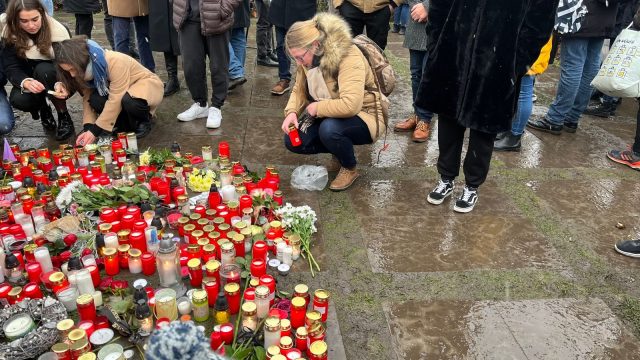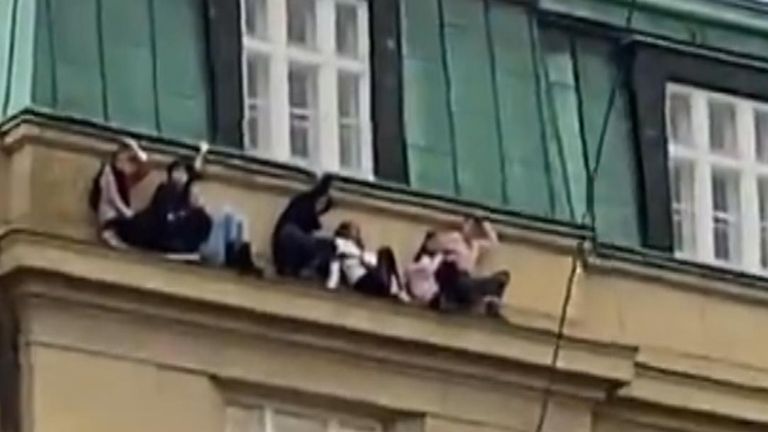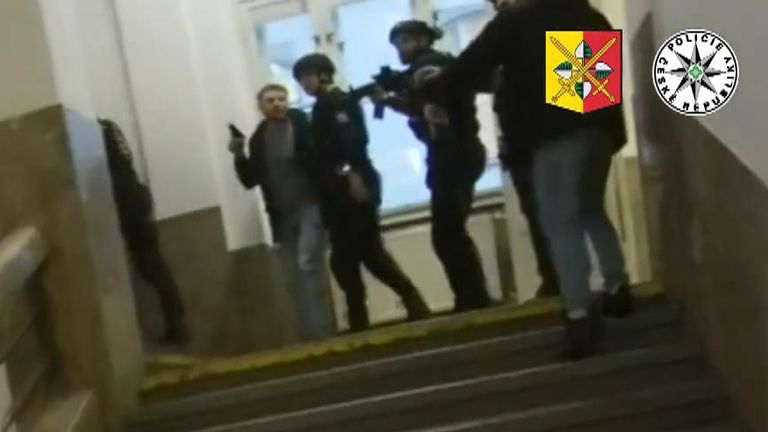There is snow billowing around the heart of Prague and the skies are dark and threatening. But a small crowd of people are simply standing, and staring.
They are looking at the flickering candles and flowers that have been left in front of the Charles University building, a memorial to those who came here and were killed in the most brutal way.
From through the clouds of snow, Sergei Medvedev crosses the road, a thick grey woolen hat on his head and a bunch of flowers in his hand.
He is here to pay his own respects, but Sergei is not simply sympathetic to the suffering of others. He was there. Right there.
Read more on this story:
Prague mass shooting: What do we know so far?
Bodycam footage shows police storming university building
Sergei is a professor at the university, as well as a radio broadcaster. He is fluent and thoughtful; it’s not hard to see why he has prospered as an academic.
Yesterday, he was giving a lecture on the building’s third floor (“that corner over there,” he says, pointing) when he heard discordant noises.
He passed it off as a passing distraction. But then came the police sirens, and the creeping sense of danger.
“There was shouting in the corridor, sirens everywhere, and we realised that something was wrong. We looked out and the whole square had been cleared; there were police all over the place.
“Then there were shots and we understood it was some kind of a terrorist act. So we blocked ourselves inside the auditorium; we took all the desks and chairs towards the doors to lock the doors.
“We turned out the lights and tried to stay away from the doors.
“At one point the special forces broke in, checked the room, then left. Then there was further shouting and shooting.
“Then an hour later the special forces came in for a second time, lay us on the floor and. Searched us rather gently.
“They took us out of the building walking down the stairs. There was blood all over the place – blood on the stairs, blood on the steps.”
It is a terrifying picture that he paints, yet here he looks composed.
“Everyone stayed calm. Everyone behaved bravely,” he says, thoughtfully.
“There were a couple of dozen students in that room and I knew that I was responsible for them. When we ran, when we saw the blood – you don’t reflect on it then.
“You have your hands on your head and you are running for safety. It’s like seeing a movie of yourself. You just keep taking the next step. You keep moving.”
He is convinced that Prague will come together in the wake of this awful tragedy, but admits it’s a shock for those who have taken for granted this city’s reputation for being safe and peaceful.
“We will stand strong,” he insists. And then he is gone, to lay his flowers, look into the flames of candles, and remember those who have died or been injured.
These impromptu memorials have sprung up around the city.
People leave matches or lighters behind, as well as extra candles, for those who came to admire, but then decide they want to be involved.
And as we stand and watch, you can’t help but be struck by the number of people sobbing and hugging. The grief is thick in the air, more desperate because it was so surprising.
Giacomo, 20, is here with his friend Max, 16. Both are 20 years old, shaking their heads in disbelief.
“The guy was there,” says Max, gesturing towards the balcony where David Kozak stood and fired out into the street.
“He was shooting – I heard shots with the sniper [rifle] and it was crazy…I’ve never heard someone shooting before.”
Giacomo agrees: “We are very sad that this happened – that so many young people died, especially at Christmas.
“The idea that someone goes to the school and doesn’t come back – it’s horrible.”
And it is a dreadful thought, played out in the most horrible way.
The country feels broken.















![“It’s hard to say goodbye” – Christian Atsu’s wife composes emotional tribute song for him [Video]](https://ghananewss.com/storage/2023/05/Christian-atsu-and-wife-100x75.jpeg)








